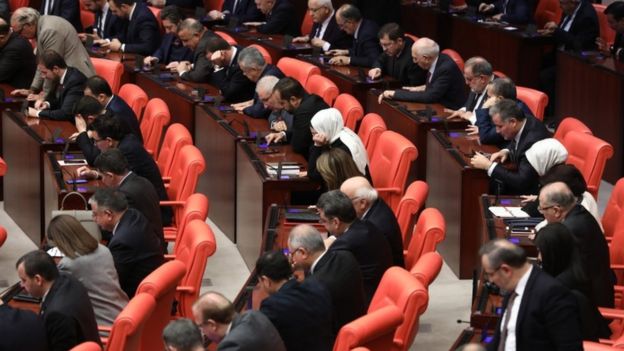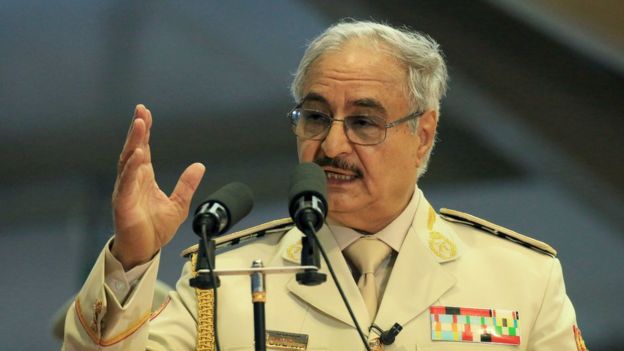 The forces of Gen Haftar have been trying to capture the capital city from the Government of National Accord (GNA), led by Prime Minister Fayez al-Serraj.
Turkey argues the Libyan conflict could threaten its interests in the country.
The forces of Gen Haftar have been trying to capture the capital city from the Government of National Accord (GNA), led by Prime Minister Fayez al-Serraj.
Turkey argues the Libyan conflict could threaten its interests in the country.
What is the background to Libya's civil conflict?
Libya has been torn by violence and division since long-time ruler Muammar Gaddafi was deposed and killed in 2011. Since then, the country has been racked by civil war, with no authority in full control. The latest episode of conflict started in April last year, when Gen Haftar launched an attack on Tripoli in an attempt to oust the internationally recognised government. But eight months on, the battle continues with the GNA keeping Gen Haftar's forces at bay on Tripoli's southern outskirts.
In recent weeks, the fighting escalated after Gen Haftar declared a "final" and decisive battle for the capital.
But eight months on, the battle continues with the GNA keeping Gen Haftar's forces at bay on Tripoli's southern outskirts.
In recent weeks, the fighting escalated after Gen Haftar declared a "final" and decisive battle for the capital.
What reaction has there been to the bill's passage?
Mr Oktay said the passage of the bill sent a "political signal" to Gen Haftar's forces. "The Libyan motion is important for the protection of the interests of our country and for the peace and stability of the region," Turkey's Foreign Minister Mevlut Cavusoglu tweeted after the vote. In contrast, Egypt said the bill amounted to "a flagrant violation of international legitimacy" on the part of Turkey. "Egypt warns against the consequences of any Turkish military intervention in Libya and stresses that such intervention will negatively affect the stability of the Mediterranean region," Egypt's foreign ministry said in a statement. Egyptian President Abdul Fattah al-Sisi chaired a meeting of the National Security Council to discuss "foreign military intervention" in Libya. Before the bill's passage, Mr Erdogan discussed the Libyan conflict with US President Donald Trump in a phone call, the Turkish presidency said.
Mr Trump and Mr Erdogan "stressed the importance of diplomacy in resolving regional issues", it said.
Ankara risks becoming even more deeply embroiled in Libya's civil conflict and its decision to deploy troops marks a new stage in the internationalisation of the conflict.
Turkey has already supplied armoured vehicles to the UN-recognised Government of National Accord in Tripoli and also operates drones on its behalf.
Turkish troops will apparently be deployed in a "training and advisory" role. But this is a highly flexible description. If the Tripoli government has its back to the wall, then Turkey may be compelled to take a more direct hand in the fighting.
Gen Khalifa Haftar's Libyan National Army is backed by Egypt, Jordan and crucially the UAE. It has received direct support on the ground from semi-official Russian military contractors and from Sudanese and Chadian mercenaries.
Turkey clearly sees Libya as part of its strategic hinterland in the eastern Mediterranean. It recently signed an economic agreement with Tripoli on energy exploration. But Turkey's actions could leave it more isolated and stoke a broader regional crisis.
Before the bill's passage, Mr Erdogan discussed the Libyan conflict with US President Donald Trump in a phone call, the Turkish presidency said.
Mr Trump and Mr Erdogan "stressed the importance of diplomacy in resolving regional issues", it said.
Ankara risks becoming even more deeply embroiled in Libya's civil conflict and its decision to deploy troops marks a new stage in the internationalisation of the conflict.
Turkey has already supplied armoured vehicles to the UN-recognised Government of National Accord in Tripoli and also operates drones on its behalf.
Turkish troops will apparently be deployed in a "training and advisory" role. But this is a highly flexible description. If the Tripoli government has its back to the wall, then Turkey may be compelled to take a more direct hand in the fighting.
Gen Khalifa Haftar's Libyan National Army is backed by Egypt, Jordan and crucially the UAE. It has received direct support on the ground from semi-official Russian military contractors and from Sudanese and Chadian mercenaries.
Turkey clearly sees Libya as part of its strategic hinterland in the eastern Mediterranean. It recently signed an economic agreement with Tripoli on energy exploration. But Turkey's actions could leave it more isolated and stoke a broader regional crisis.
DISCLAIMER: The Views, Comments, Opinions, Contributions and Statements made by Readers and Contributors on this platform do not necessarily represent the views or policy of Multimedia Group Limited.
Tags:
Latest Stories
-
WAFU B U-17 Championship: Ghana drawn in Group A, face Benin and Cote d’Ivoire
11 mins -
Two hit by stray bullet as Police clash with ‘wee smokers’
24 mins -
Okyeame Kwame aims for another Artiste of the Year win after 15 years
35 mins -
NAGRAT gives government one-week ultimatum to redeem unpaid pensions for 700,000 workers
38 mins -
Deloitte launches Technology, Media and Telecom predictions for 2024
55 mins -
Meta AI expands to Ghana, Nigeria and other countries in Africa; adds new features
1 hour -
GPL: Expect a new Kotoko against Samartex – Ogum tells fans
2 hours -
Court orders service of notice for DNA test to Mohbad’s wife
2 hours -
Changes to Ghana’s oil and gas royalty and licensing scheme to be implemented in 2024
2 hours -
Ghana’s oil production to rebound in 2024 growing by 5% – Fitch Solutions
2 hours -
Davido gifts fan $50K to clear off her student loan
2 hours -
Netflix: Profits soar after password sharing crackdown
2 hours -
OSP files additional charges against former PPA CEO Adjenim Boateng Adjei
3 hours -
Samuel Anini’s ‘Legacy of Hope’ to be launched in Finland
3 hours -
Fitch Solutions projects 19.0% average inflation for Ghana in 2024
3 hours

